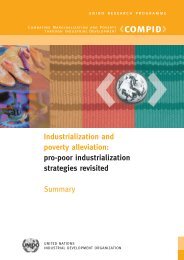Manual on the Development of Cleaner Production Policies ... - Unido
Manual on the Development of Cleaner Production Policies ... - Unido
Manual on the Development of Cleaner Production Policies ... - Unido
You also want an ePaper? Increase the reach of your titles
YUMPU automatically turns print PDFs into web optimized ePapers that Google loves.
DEVELOPMENT OF CP POLICY<br />
MODULE 3: CP POLICY DEVELOPMENT CYCLE<br />
instituti<strong>on</strong>s participating in <strong>the</strong> development <strong>of</strong> o<strong>the</strong>r nati<strong>on</strong>al policies, and, toge<strong>the</strong>r with <strong>the</strong>m, to<br />
brainstorm <strong>on</strong> <strong>the</strong> correct approach to CP policy development and <strong>on</strong> stakeholder analysis. Ano<strong>the</strong>r<br />
opti<strong>on</strong> is to interview <strong>the</strong> members <strong>of</strong> <strong>the</strong> Centre’s Advisory Council and Executive Board <strong>on</strong> <strong>the</strong><br />
issue. It is assumed that <strong>the</strong> CP Centre is developing policy. Naturally, if <strong>the</strong> Government decides to<br />
develop a policy <strong>on</strong> its own <strong>the</strong> Centre should seek active involvement and participati<strong>on</strong>.<br />
In any analysis, it is important to ensure that <strong>the</strong> identified stakeholders are not limited to <strong>on</strong>e ministry<br />
or government agency. An identificati<strong>on</strong> <strong>of</strong> stakeholders should take into account why <strong>the</strong><br />
stakeholders are important, what role <strong>the</strong>y could play and which <strong>of</strong> <strong>the</strong>ir needs and interests could be<br />
met through participati<strong>on</strong> in <strong>the</strong> policy development process. The truth is that no high-level policy<br />
player will participate in some<strong>on</strong>e else’s programme unless <strong>the</strong>y see a benefit for <strong>the</strong>ir own<br />
organizati<strong>on</strong>. It is, <strong>the</strong>refore, crucial to try to c<strong>on</strong>sider CP policy development from <strong>the</strong> stakeholder’s<br />
perspective and to appreciate what motivates each stakeholder.<br />
The role <strong>of</strong> key individuals should not be overlooked. It is not <strong>the</strong> instituti<strong>on</strong> that will be participating<br />
in CP policy development, but ra<strong>the</strong>r Ms. X or Mr. Z from that instituti<strong>on</strong>. This means that even <strong>the</strong><br />
most powerful instituti<strong>on</strong> will not effectively support CP policy if a junior <strong>of</strong>ficer—with no access to<br />
decisi<strong>on</strong> makers—is selected to participate in <strong>the</strong> effort. The policy group will be in a positi<strong>on</strong> to claim<br />
that <strong>the</strong> instituti<strong>on</strong> has participated in <strong>the</strong> work, but in practical terms, access to top level decisi<strong>on</strong><br />
makers is imperative.<br />
SLIDE: Stakeholders and <strong>the</strong>ir c<strong>on</strong>tributi<strong>on</strong>s<br />
• Nati<strong>on</strong>al government;<br />
• Legislative branch;<br />
• Enterprises and plants;<br />
• Chambers <strong>of</strong> industry and sector-specific associati<strong>on</strong>s;<br />
• Envir<strong>on</strong>mental service providers and CP c<strong>on</strong>sultants;<br />
• Universities and <strong>the</strong> educati<strong>on</strong> sector;<br />
• Financial sector;<br />
• N<strong>on</strong>-governmental organizati<strong>on</strong>s;<br />
• <strong>Cleaner</strong> Producti<strong>on</strong> Centre/CP instituti<strong>on</strong>s;<br />
• Internati<strong>on</strong>al organizati<strong>on</strong>s;<br />
• Municipal governments;<br />
• Trade and labour uni<strong>on</strong>s.<br />
Previous slides stressed that a multi-stakeholder approach is important. Using<br />
this slide, dem<strong>on</strong>strate to participants why participati<strong>on</strong> <strong>of</strong> various stakeholders<br />
is important and <strong>the</strong> valuable c<strong>on</strong>tributi<strong>on</strong>s that <strong>the</strong>y can all make in <strong>the</strong> CP<br />
policy development process.<br />
Background<br />
Policy-making has traditi<strong>on</strong>ally been a government-dominated field, involving a small and sometimes<br />
hermetic group <strong>of</strong> players. This situati<strong>on</strong> has started to change in <strong>the</strong> last two decades, especially in<br />
fields such as envir<strong>on</strong>mental protecti<strong>on</strong>, where different interests come into play and <strong>the</strong> general<br />
public has a str<strong>on</strong>g say. CP policy development needs <strong>the</strong> support, inputs, and participati<strong>on</strong> <strong>of</strong><br />
different players. The potential role and c<strong>on</strong>tributi<strong>on</strong> <strong>of</strong> <strong>the</strong> most important <strong>on</strong>es are discussed below:<br />
PAGE 54
















